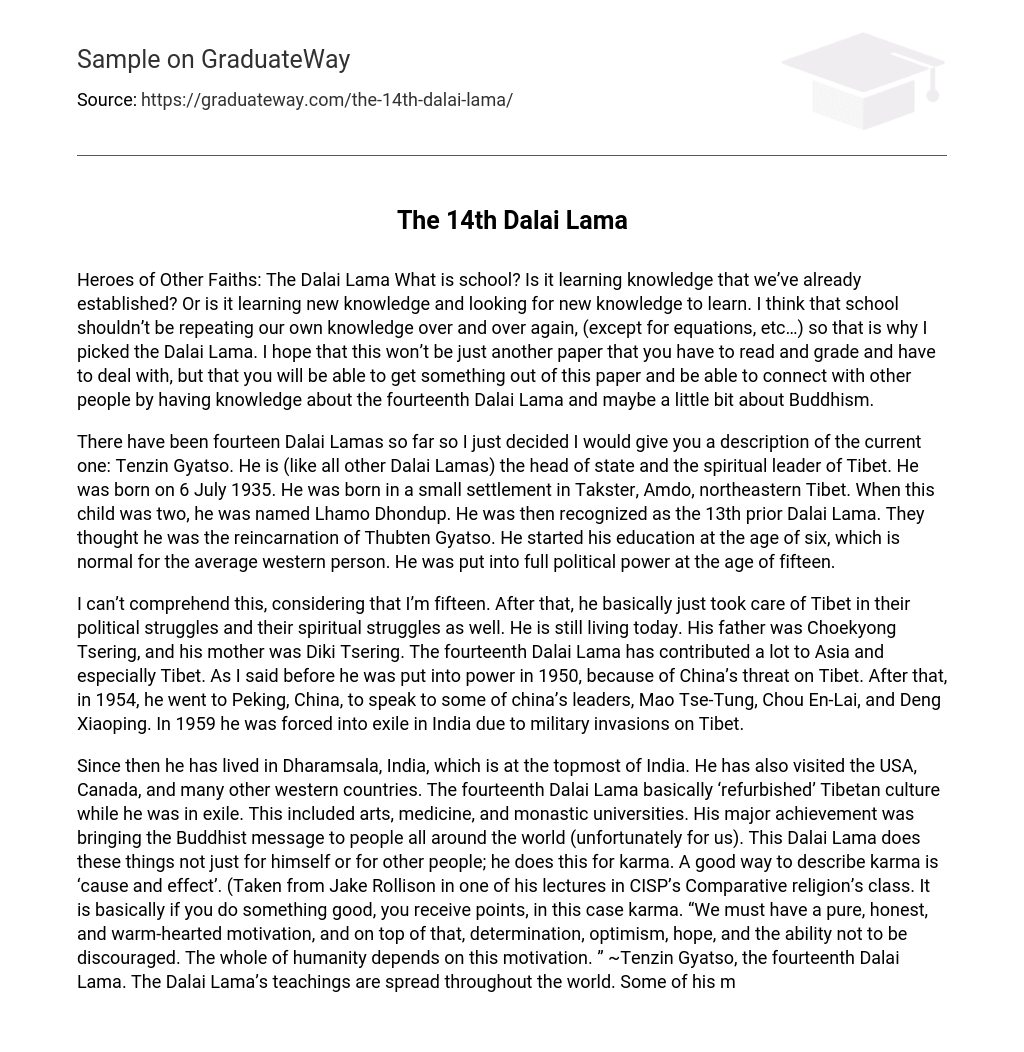Heroes of Other Faiths: The Dalai Lama What is school? Is it learning knowledge that we’ve already established? Or is it learning new knowledge and looking for new knowledge to learn. I think that school shouldn’t be repeating our own knowledge over and over again, (except for equations, etc…) so that is why I picked the Dalai Lama. I hope that this won’t be just another paper that you have to read and grade and have to deal with, but that you will be able to get something out of this paper and be able to connect with other people by having knowledge about the fourteenth Dalai Lama and maybe a little bit about Buddhism.
There have been fourteen Dalai Lamas so far so I just decided I would give you a description of the current one: Tenzin Gyatso. He is (like all other Dalai Lamas) the head of state and the spiritual leader of Tibet. He was born on 6 July 1935. He was born in a small settlement in Takster, Amdo, northeastern Tibet. When this child was two, he was named Lhamo Dhondup. He was then recognized as the 13th prior Dalai Lama. They thought he was the reincarnation of Thubten Gyatso. He started his education at the age of six, which is normal for the average western person. He was put into full political power at the age of fifteen.
I can’t comprehend this, considering that I’m fifteen. After that, he basically just took care of Tibet in their political struggles and their spiritual struggles as well. He is still living today. His father was Choekyong Tsering, and his mother was Diki Tsering. The fourteenth Dalai Lama has contributed a lot to Asia and especially Tibet. As I said before he was put into power in 1950, because of China’s threat on Tibet. After that, in 1954, he went to Peking, China, to speak to some of china’s leaders, Mao Tse-Tung, Chou En-Lai, and Deng Xiaoping. In 1959 he was forced into exile in India due to military invasions on Tibet.
Since then he has lived in Dharamsala, India, which is at the topmost of India. He has also visited the USA, Canada, and many other western countries. The fourteenth Dalai Lama basically ‘refurbished’ Tibetan culture while he was in exile. This included arts, medicine, and monastic universities. His major achievement was bringing the Buddhist message to people all around the world (unfortunately for us). This Dalai Lama does these things not just for himself or for other people; he does this for karma. A good way to describe karma is ‘cause and effect’. (Taken from Jake Rollison in one of his lectures in CISP’s Comparative religion’s class. It is basically if you do something good, you receive points, in this case karma. “We must have a pure, honest, and warm-hearted motivation, and on top of that, determination, optimism, hope, and the ability not to be discouraged. The whole of humanity depends on this motivation. ” ~Tenzin Gyatso, the fourteenth Dalai Lama. The Dalai Lama’s teachings are spread throughout the world. Some of his main ideas/quotes are: “Be kind whenever possible. It is always possible. ” ~ Tenzin Gyatso (the fourteenth Dalai Lama). I completely agree with this quote, even though I sometimes do the opposite of this.
I think this is right because first of all, we are made in God’s image, this means that if we mistreat a person, we are mistreating one of God’s many creations. “It is very important to generate a good attitude, a good heart, as much as possible. From this, happiness in both the short term and the long term for both yourself and others will come. ” ~ Tenzin Gyatso (the fourteenth Dalai Lama). This is a very good description of how Buddhism goes; if you do good, good things will come to you. “If you can, help others; if you cannot do that, at least do not harm them. ”~Tenzin Gyatso (the fourteenth Dalai Lama).
This idea is mostly based off of the caste system. He thinks that we are all in this cycle that the world would be a lot better if we helped eachother. Which I agree with the helping eachother part, but about the caste system, I would have to disagree with, especially because like I said before, we are all made in God’s image making all of us equal. Before I wrote a paper on the Dalai Lama I knew didly squat about him and everything around him. Now, I am very glad that I was able to choose him and learn about his culture and teachings. I think that the Dalai Lama is a very important person to history, and especially to Tibet.
I am not able to quite see his effect in culture and history due to being in the same time of him. [pic] http://www. wisdomofforgiveness. com/dl. htm Websites visited: http://www. dalailama. com/ http://en. wikipedia. org/wiki/Dalai_Lama http://answers. ask. com/Society/Other/where_does_the_dali_lama_live http://www. nobelprize. org/nobel_prizes/peace/laureates/1989/lama-bio. html http://www. som. org/NewPages/Newsite07/SOMBar/Course/Meditation. html http://www. dalailama. com/teachings http://www. brainyquote. com/quotes/authors/d/dalai_lama. html (I know it’s a lot but I’m pretty sure that’s all of them. )





